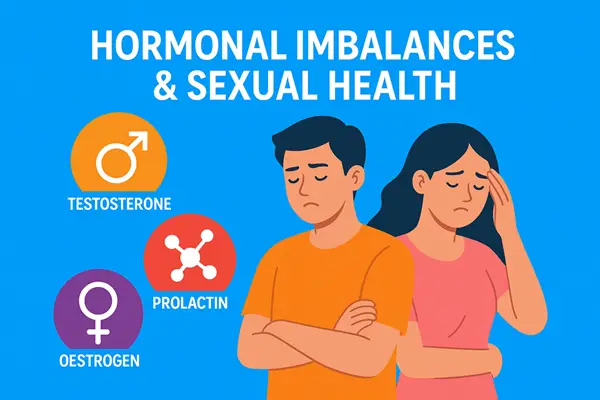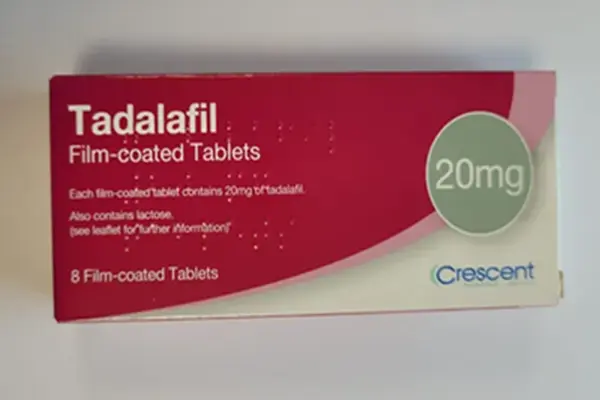Hormones regulate many of the body’s essential functions, from metabolism and sleep to mood and sexual health. When these chemical messengers fall out of balance, the effects are often noticeable in energy levels, reproductive function, and intimacy. For both men and women, three of the most important hormones influencing sexual health are testosterone, prolactin, and oestrogen.
An imbalance in any of these can lead to reduced libido, fertility problems, and changes in physical or emotional wellbeing. Understanding the role of each hormone, how imbalances present, and which treatments are available is key to protecting long-term sexual health.
Testosterone and sexual health
Testosterone is the primary male sex hormone, although women also produce it in smaller amounts. It plays a crucial role in maintaining libido, erectile function, muscle mass, bone density, and mood stability.
When testosterone levels decline, symptoms may include:
- Loss of interest in sexual activity
- Erectile dysfunction or difficulty maintaining erections
- Reduced sperm count and fertility problems
- Fatigue and lower energy
- Increased fat around the abdomen and reduced muscle mass
- Irritability, brain fog, or low mood
Low testosterone, also called hypogonadism, may be linked to ageing, chronic illnesses such as diabetes, obesity, or even the use of certain medications. Some men experience symptoms gradually, while others notice sudden changes. Women with low testosterone may also experience low libido, fatigue, and reduced sexual satisfaction.
Treatments available through TitanPharmax’s catalogue include testosterone replacement therapies and agents that stimulate natural testosterone production. These therapies aim to restore hormonal balance, improve sexual function, and enhance vitality when prescribed and monitored appropriately.
Prolactin and its effects
Prolactin is produced by the pituitary gland and is best known for stimulating breast milk production after childbirth. While vital for nursing mothers, excessive prolactin levels can disrupt sexual health in both men and women.
High prolactin, also called hyperprolactinaemia, can cause:
- Reduced libido and difficulty achieving orgasm
- Erectile dysfunction in men
- Menstrual irregularities or absent periods in women
- Infertility in both sexes
- Breast tenderness or milk production in non-breastfeeding individuals
Raised prolactin may be caused by pituitary tumours, known as prolactinomas, or by certain medications, including antipsychotics and anti-nausea drugs. In some cases, stress and poor sleep can also contribute.
Treatment often involves dopamine agonists, which reduce prolactin levels by stimulating dopamine activity in the brain. TitanPharmax offers therapies that regulate prolactin, supporting improved fertility, sexual function, and overall quality of life.
The role of oestrogen
Oestrogen is primarily associated with female sexual and reproductive health, but it is also present in men. It influences menstrual cycles, vaginal health, and mood in women, while in men it contributes to bone health and helps regulate libido when balanced with testosterone.
When oestrogen is too low, which is common in menopause or after certain medical treatments, women may experience:
- Vaginal dryness and discomfort during sex
- Hot flushes and night sweats
- Loss of libido
- Mood swings and irritability
- Thinning bones over time
When oestrogen is too high, particularly in men, it may cause:
- Reduced testosterone activity and low libido
- Erectile dysfunction
- Gynaecomastia (enlarged breast tissue)
- Weight gain and fatigue
Treatments vary depending on the individual’s needs. For women, hormone replacement therapy (HRT) can relieve symptoms of menopause by restoring healthy oestrogen levels. For men, therapies that rebalance testosterone and oestrogen may improve sexual function and energy. TitanPharmax provides regulated hormone therapies that meet strict safety standards.
Recognising hormonal imbalance
Hormonal imbalances can be subtle at first. Many people dismiss fatigue, irritability, or low libido as stress-related, when in fact they may be symptoms of disrupted hormone levels. Warning signs include:
- Persistent lack of sexual desire
- Difficulty achieving or maintaining erections
- Irregular or absent menstrual cycles
- Infertility despite trying to conceive
- Unexpected weight gain, muscle loss, or hair changes
- Low mood, anxiety, or sleep problems
Because these symptoms overlap with other health issues, the only reliable way to diagnose hormonal imbalance is through blood tests. A doctor can measure testosterone, prolactin, oestrogen, and other hormones to build a clear picture of what is happening.
How treatment helps restore balance
Treating hormonal imbalance requires a tailored approach. Simply replacing one hormone is not always enough, as the body’s endocrine system is interconnected. Treatments from TitanPharmax are designed to restore balance in a way that supports both sexual health and overall wellbeing.
Options include:
- Testosterone replacement therapy: Restores normal testosterone levels, improving libido, erectile function, muscle strength, and mood.
- Prolactin-lowering agents: Dopamine agonists that reduce high prolactin levels, supporting fertility and sexual function.
- Oestrogen therapy: Used in HRT for women to relieve menopausal symptoms such as dryness and low libido.
- Combination approaches: In some cases, therapies are used together to balance multiple hormones at once.
Close medical supervision ensures safe dosage, monitoring of blood levels, and adjustments as needed.
Broader health consequences of imbalance
Sexual health is often the first area where hormonal imbalance is noticed, but the effects extend beyond intimacy. Low testosterone may increase cardiovascular risk and reduce bone strength. High prolactin can cause headaches and vision problems if linked to pituitary tumours. Low oestrogen in women increases the risk of osteoporosis, while high oestrogen in men can contribute to metabolic changes.
By addressing imbalances early, treatments not only restore sexual health but also protect long-term physical wellbeing.
The importance of medical guidance
Hormone therapies should never be self-administered without professional advice. Incorrect use can lead to side effects such as cardiovascular strain, liver damage, or further hormonal disruption. Doctors will usually conduct a thorough history, blood tests, and ongoing monitoring before and during treatment.
TitanPharmax ensures that its treatments meet regulatory standards for safety, consistency, and quality, giving patients and healthcare professionals confidence in their use.
Final thoughts
Hormonal balance underpins sexual health and overall vitality. Testosterone, prolactin, and oestrogen each play critical roles, and when levels shift outside the healthy range, the impact can be profound. From reduced libido and fertility problems to changes in mood and energy, the consequences of imbalance affect both personal wellbeing and relationships.
Through safe and regulated treatments, TitanPharmax provides solutions that help restore balance, improve sexual health, and enhance quality of life. With proper medical guidance, patients can find effective ways to regain control of their hormones and enjoy long-term benefits.


